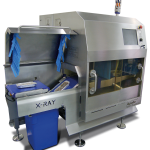By: Phil Brown, Managing Director, Fortress Technology Europe
A key cog in any food processor’s business is the performance and efficiency of production equipment. However, a machine’s list price is just 10-15% of the overall Total Cost of Ownership (TCO), suggest industry experts.
Operational and energy costs, ongoing support, sourcing replacement parts, maintenance and repair fees, downtime and productivity all form part of the TCO calculation.
False bargains
Inspecting for contaminants, including metal, is a prerequisite for brand protection. Short-term frugality with inspection equipment is not always worth it. Be sure that any technical advantage will actually add production value.
Always consider the upgradeability of equipment. So long as the structural inspection machine is sound, the process of rolling out upgrades requires minimal time, investment and business disruption, compared with commissioning an entirely new build and installation.
Fortress inspection systems have been designed to be easily upgraded so that the machines are used throughout their service life. With the right maintenance, they can run for 20+ years.
Part obsolescence
When a new machine launches, the price of spares also tends to climb. If your supplier isn’t prepared to be upfront about replacement part costs or machine failure rates, that’s a big red flag. Having interchangeable parts reduces the number of components held on site, and keeps costs down.
Lost profits
For many manufacturers, downtime is a significant drain on profit. While no value is being produced, operational overhead costs continue to grow.
Equipment failure is the leading cause of this issue. Rather than reacting to emergency tasks, Fortress recommends customers perform an annual preventative maintenance check. Additionally, carrying out straightforward maintenance can make a big difference to a system’s running costs.
Human errors
Operator mistakes are the second largest cause of unplanned machine downtime. Regardless of how up-to-date food inspection systems are, human error and misuse can never be completely ruled out by machines.
It’s essential that robust procedures and practices are in place and that staff clearly understand their roles and responsibilities. Automatic test technology can also save significant resources by slashing the time any problem with a metal detector goes undetected.
Fortress lives by the ethos If it ain’t broke, don’t fix it. Providing the base unit is in good working order, it can be updated with the very latest technology to optimise TCO.







